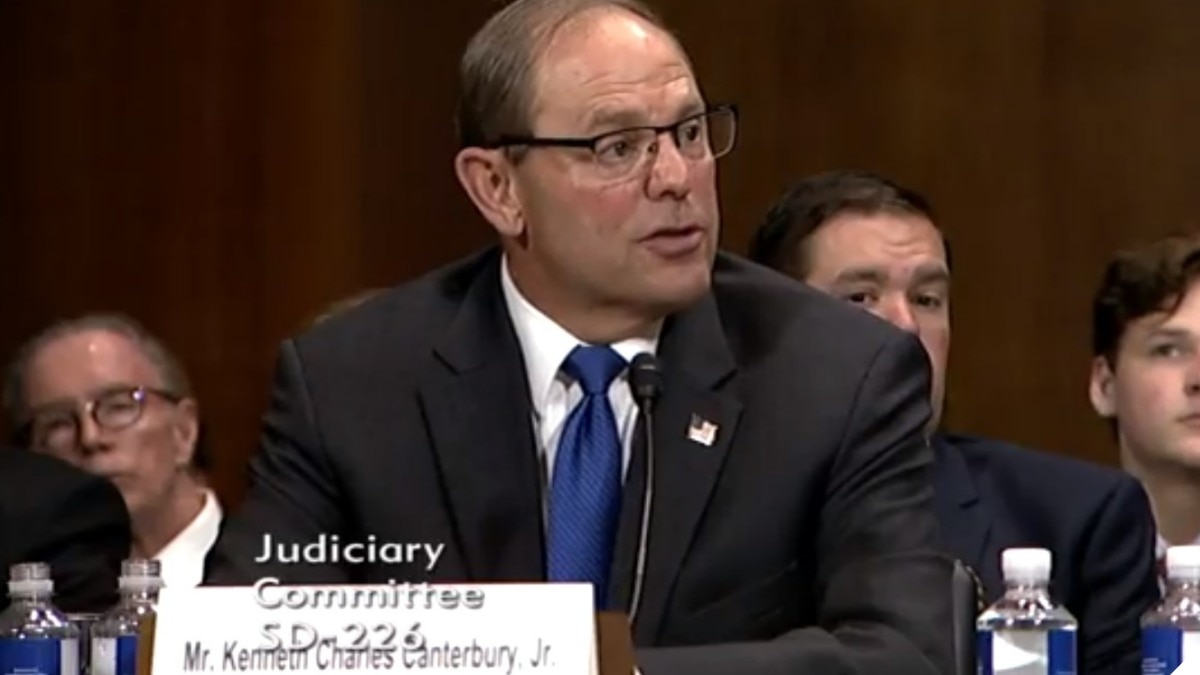ATF DIRECTOR NOMINEE: NO SUPPORT FOR FURTHER GUN RESTRICTIONS
1st Aug 2019
Credit Source: Guns.com, by Chris Eger
Click Here to read the original article.

Chuck Canterbury, up for the position of ATF boss, underwent two hours of Senate hearings this week. (Photo: Screen-capture of video from U.S. Senate Judiciary Committee)
Kenneth Charles “Chuck” Canterbury, Jr., President Trump’s nominee for Director of the Bureau of Alcohol, Tobacco, Firearms and Explosives, underwent a round of hearings in front of the Senate Judiciary Committee on Wednesday.
The long-term president of the National Fraternal Order of Police, Canterbury has held his current spot in the 350,000-strong group since 2003. A South Carolina resident, he formerly served 26 years in the Horry County Police Department in the Palmetto State and was nominated for the vacant position of ATF boss in June.
In this week’s two-hour hearing, U.S. Sens. Dianne Feinstein, D-Calf., and Mike Lee, R-Utah, interchangeably grilled Canterbury about his stance on a federal ban on “assault weapons” and their associated magazines, as well as universal background checks, handgun waiting periods and other questions of gun policy. Canterbury responded that, while the FOP supported such gun control measures in the 1990s, the lobby group presently does not espouse such changes to current law. When pressed on his personal feelings on such restrictive concepts, Canterbury said he is “a strong supporter of the Second Amendment and I believe in the right to bear arms.”
Sen. Josh Hawley, a Missouri Republican who formerly served as that state’s attorney general, asked Canterbury about his take on the Show-Me State’s practice of constitutional carry, to which the nominee said his individual view on that matter was that it did not involve the feds. “I believe that right is governed by the Missouri General Assembly and I don’t think there would be any enforcement right by ATF on that,” Canterbury said.
After Hawley returned to questions on Canterbury’s perspective on the now-expired 1994 federal assault weapon ban, the FOP president said he did not personally support it when it was put into place. In later questions, Canterbury doubled down on his opposition to the ban saying, “in my personal opinion the law was not effective.” Canterbury subsequently stated he introduced the resolution to rescind FOP’s historic support of the gun prohibition.
Sen. John Kennedy asked the nominee what gun restrictions he was in favor of, or would move to support through ATF rule changes, to which Canterbury replied to the Republican from Louisiana that, “I don’t support any further gun restrictions.”
Sen. Ted Cruz brought a fresh round of questions over Canterbury’s personal take on expanding background checks. “As Director of ATF, would you support extending mandatory federal background checks to private transactions between people who are not [licensed] dealers?” asked the Texas Republican.
Canterbury said he would not, “because I do believe in the Second Amendment and I do believe those individual sales are guaranteed under current law.”
This particular response drew quick condemnation from the Bloomberg-backed Everytown gun control group who slammed Canterbury’s apparent shift from FOP’s previous stand. “We were disappointed to see Mr. Canterbury reverse his position on background checks today, and must oppose his nomination,” said John Feinblatt, Everytown’s president, after the hearing.
Going into this week’s confirmation hearings, Canterbury enjoyed the support of trade organizations for the firearms and suppressor industries — the National Shooting Sports Foundation and American Suppressor Association. Meanwhile, two firearm owner member groups, Gun Owners of America and the National Association of Gun Rights, have opposed his nomination.
If confirmed by the Senate, Canterbury will be the first permanent ATF director since B. Todd Jones resigned in 2015 during the Obama administration.

